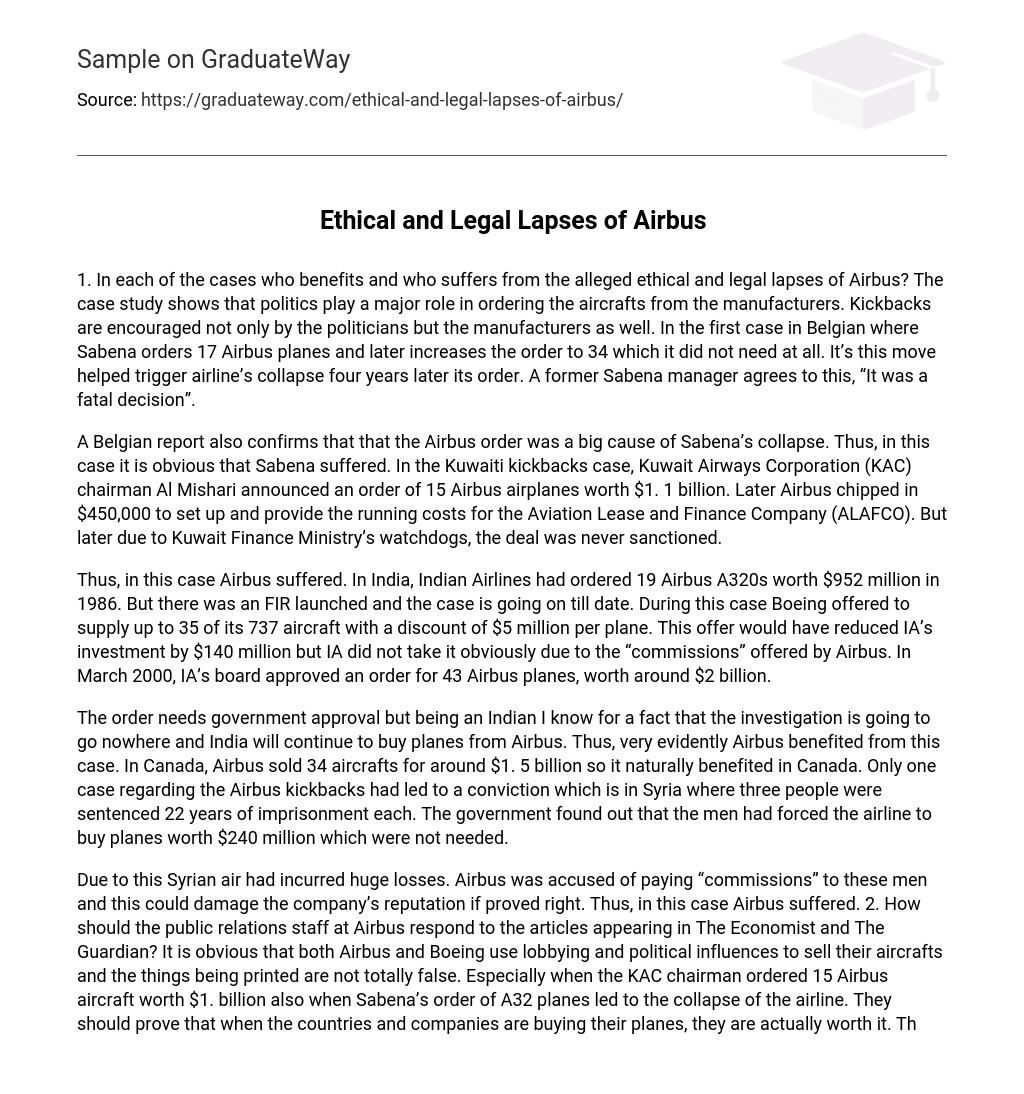1. In each of the cases who benefits and who suffers from the alleged ethical and legal lapses of Airbus? The case study shows that politics play a major role in ordering the aircrafts from the manufacturers. Kickbacks are encouraged not only by the politicians but the manufacturers as well. In the first case in Belgian where Sabena orders 17 Airbus planes and later increases the order to 34 which it did not need at all. It’s this move helped trigger airline’s collapse four years later its order. A former Sabena manager agrees to this, “It was a fatal decision”.
A Belgian report also confirms that that the Airbus order was a big cause of Sabena’s collapse. Thus, in this case it is obvious that Sabena suffered. In the Kuwaiti kickbacks case, Kuwait Airways Corporation (KAC) chairman Al Mishari announced an order of 15 Airbus airplanes worth $1. 1 billion. Later Airbus chipped in $450,000 to set up and provide the running costs for the Aviation Lease and Finance Company (ALAFCO). But later due to Kuwait Finance Ministry’s watchdogs, the deal was never sanctioned.
Thus, in this case Airbus suffered. In India, Indian Airlines had ordered 19 Airbus A320s worth $952 million in 1986. But there was an FIR launched and the case is going on till date. During this case Boeing offered to supply up to 35 of its 737 aircraft with a discount of $5 million per plane. This offer would have reduced IA’s investment by $140 million but IA did not take it obviously due to the “commissions” offered by Airbus. In March 2000, IA’s board approved an order for 43 Airbus planes, worth around $2 billion.
The order needs government approval but being an Indian I know for a fact that the investigation is going to go nowhere and India will continue to buy planes from Airbus. Thus, very evidently Airbus benefited from this case. In Canada, Airbus sold 34 aircrafts for around $1. 5 billion so it naturally benefited in Canada. Only one case regarding the Airbus kickbacks had led to a conviction which is in Syria where three people were sentenced 22 years of imprisonment each. The government found out that the men had forced the airline to buy planes worth $240 million which were not needed.
Due to this Syrian air had incurred huge losses. Airbus was accused of paying “commissions” to these men and this could damage the company’s reputation if proved right. Thus, in this case Airbus suffered. 2. How should the public relations staff at Airbus respond to the articles appearing in The Economist and The Guardian? It is obvious that both Airbus and Boeing use lobbying and political influences to sell their aircrafts and the things being printed are not totally false. Especially when the KAC chairman ordered 15 Airbus aircraft worth $1. billion also when Sabena’s order of A32 planes led to the collapse of the airline. They should prove that when the countries and companies are buying their planes, they are actually worth it. Their engines are better than Boeing’s, and they provide proper seating, baggage and freight loads. The PR staff should also be more open about what is presently happening within the company. It should quote comments of the new staff and also provide press releases to make people realize that whatever happened is now eliminated.
3. What steps might Boeing take to defend itself from this sort of competition? Certain countries have an anti-American bias which gives Airbus an advantage over Boeing and in countries like Syria, Boeing has been prohibited to export there. The articles printed for Airbus clearly showed the bribes they provided with the agreements that Boeing can point out. Boeing can also provide lower prices to its customers by turning to outsourcing which is always cheaper. With the method of outsourcing Boeing will also build a relationship with various marketers and suppliers.
Boeing could also provide different set of value propositions like, •Quality aspect •Higher technology aspect •Better passenger capacity. 4. Do you think Boeing and Airbus behave differently in marketing their aircraft around the globe? How and why? Yes Boeing and Airbus do behave differently in marketing their aircraft around the globe as Boeing is an American based firm and Airbus is represented by a bunch of European countries. While selling the aircrafts these companies go through the “middlemen” which Airbus considers as some sort of valuable asset.
In almost every case that we went through showed that Airbus used some sort of bribery to sell their aircrafts through these “middlemen” which can be eliminated. This could also be happening because the standard of the aircrafts might not be up to the mark. If the quality of one company exceed that of the other, it would be easier for the airlines to choose. During the case study, we noticed that Boeing acted more responsible and ethical. It also followed the procedures and standards as compared to Airbus where it used methods of bribery and kickbacks in India and Kuwait.





